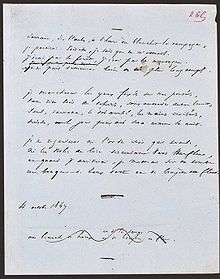Demain dès l'aube
| by Victor Hugo | |
 Manuscript of the poem. You can read the actual entry date: October 4, 1847 and not September 3 | |
| First published in | 1847 |
|---|---|
| Country | France |
| Language | French |
| Series | Les Contemplations |
| Publication date | 1856 |
| Lines | 12 |
Demain dès l'aube is one of French writer Victor Hugo's most famous poems. It was published in his 1856 collection Les Contemplations. It consists of three quatrains of rhyming alexandrines. The poem describes a visit to his daughter Léopoldine Hugo's grave.
Text and translation
Demain, dès l'aube, à l'heure où blanchit la campagne, Je partirai. Vois-tu, je sais que tu m'attends. J'irai par la forêt, j'irai par la montagne. Je ne puis demeurer loin de toi plus longtemps. Je marcherai les yeux fixés sur mes pensées, Sans rien voir au dehors, sans entendre aucun bruit, Seul, inconnu, le dos courbé, les mains croisées, Triste, et le jour pour moi sera comme la nuit. Je ne regarderai ni l'or du soir qui tombe, Ni les voiles au loin descendant vers Harfleur, Et, quand j'arriverai, je mettrai sur ta tombe Un bouquet de houx vert et de bruyère en fleur. |
Tomorrow, at dawn, at the moment when the land whitens, |
References
- ↑ picmots.wordpress.com/2017/12/01/demain-des-laube-de-victor-hugo/